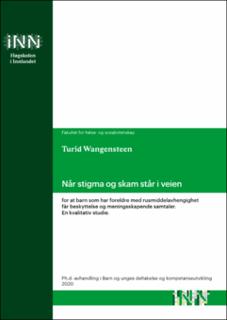| dc.contributor.author | Wangensteen, Turid | |
| dc.date.accessioned | 2020-03-09T12:45:25Z | |
| dc.date.available | 2020-03-09T12:45:25Z | |
| dc.date.issued | 2020 | |
| dc.identifier.isbn | 978-82-8380-172-9 | |
| dc.identifier.isbn | 978-82-8380-173-6 | |
| dc.identifier.issn | 2535-7433 | |
| dc.identifier.issn | 2535-7441 | |
| dc.identifier.uri | http://hdl.handle.net/11250/2646029 | |
| dc.description | De publiserte artiklene har blitt fjernet fra den digitale versjonen, på grunn av manglende tillatelser fra tidsskrift. Se de aktuelle tidsskriftene eller den trykte avhandlingen for å lese artiklene. / The published articles have been removed from the digital thesis due to copyright restrictions. They can be read in their journals or in the printed thesis. | |
| dc.description.abstract | Foreldres rusmiddelavhengighet rammer barna hardt, uavhengig av type rusmiddel, sosioøkonomisk bakgrunn og bosted. Det mange av barna har til felles er opplevelsen av redsel, skam og svik, men også av kjærlighet og nærhet til sine foreldre. Hensikten med denne studien var å få økt forståelse for barns opplevelser og behov når foreldre har rusmiddelavhengighet. Overordnet problemstilling er: Hvordan opplever barn og unge sin oppvekst med foreldre med rusmiddelavhengighet, og hvordan får de hjelp til å skape mening knyttet til sine barndomserfaringer? Datamaterialet består av kvalitative intervjuer med 12 ungdommer/unge voksne som har foreldre med rusmiddelavhengighet, og 7 foreldre/pasienter og 18 barneansvarlige i rusbehandling. Avhandlingen bygger på sosialkonstruksjonistiske og systemiske perspektiver. Det er benyttet to analytiske tilnærminger: fortolkende fenomenologisk analyse (IPA), og paradigmatisk analyse av narrativer. Analysen av datamaterialet resulterte i tre overordnede funn: 1. Stigma og skam nyttet til foreldres rusmiddelavhengighet oppleves som en ekstra belastning for barna. 2. Relasjonen mellom barn og foreldre er viktig, også når de ikke bor sammen. Barn har behov for beskyttelse mot foreldres rusmiddelbruk, men ikke nødvendigvis mot foreldrene. 3. Barn og unge har behov for, men mangler muligheter til å skape sammenheng og mening gjennom samtaler med voksne. Funnene er diskutert gjennom å se til tidligere forskning, samt en systemisk tilnærming med teorier og diskurser knyttet til familieliv, foreldreskap, barns oppvekst, rusmiddelavhengighet, stigma og meningsskapende samtaler. Studien konkluderer med at stigma og skam knyttet til foreldreskap og rusmiddelavhengighet kan stå i veien for at barna får nødvendig beskyttelse, kontinuitet i viktige relasjoner og meningsskapende samtaler med trygge voksne. Utvikling av nye diskurser og handlingsalternativer knyttet til forståelsen av foreldreskap og rusmiddelavhengighet, kan bidra til å gi barna og familiene bedre tverrfaglig hjelp og støtte. | nb_NO |
| dc.description.abstract | Abstract: Parental substance use disorder (SUD) strongly affects children, regardless of the type of substance, socioeconomic background and place of residence. What many of the children of parents with SUD have in common is their experience of fear, shame, and betrayal, but they also love and feel a closeness to their parents. The purpose of this study was to gain broader knowledge and understanding of children's experiences and needs when parents have a SUD. This topic was explored through the main research question: How do children and adolescents perceive their childhood with parents with substance use disorder, and what support is provided to help them to create meaning related to childhood experiences? The data consist of qualitative interviews with 12 adolescents/young adults who have parents with SUD, 7 parents/patients, and 18 therapists responsible for working with children and families in SUD treatment. The thesis is based on social construction and systemic perspectives. Two analytical approaches have been used: interpretive phenomenological analysis (IPA) and paradigmatic analysis of narratives. The analysis of the data resulted in three main findings: 1. Stigma and shame related to parental SUD are perceived as an extra burden for the children. 2. The relationship between children and parents is essential, even when they are not living together. The child needs protection against substance use but not necessarily against the parents. 3. Children and young people are in need of, but lack opportunities to create coherence and meaning through conversations with adults. These findings are discussed by looking at previous research, as well as a systemic approach with theories and discourses on family life, parenthood, childhood, SUD, stigma, shame, and meaningful conversations. The study suggests that stigma and shame related to parental SUD may interfere with the child being provided the necessary protection, continuity in significant relationships, and meaningful conversations with trusted adults. Development of new discourses and alternative actions in relation to the understanding of parenthood and SUD, may contribute towards providing children and families with sufficient interdisciplinary help and support. | nb_NO |
| dc.language.iso | nob | nb_NO |
| dc.publisher | Høgskolen i Innlandet | nb_NO |
| dc.relation.ispartofseries | Ph.d.-avhandling i barn og unges deltakelse og kompetanseutvikling;13 | |
| dc.title | Når stigma og skam står i veien for at barn som har foreldre med rusmiddelavhengighet får beskyttelse og meningsskapende samtaler. En kvalitativ studie | nb_NO |
| dc.type | Doctoral thesis | nb_NO |
| dc.subject.nsi | VDP::Samfunnsvitenskap: 200::Sosialt arbeid: 360 | |
| dc.source.pagenumber | 176 | nb_NO |
